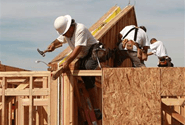Analysis

February 20, 2022
NAHB: Housing Starts Down in January
Written by David Schollaert
Housing starts fell in January as builders reported continued supply-chain troubles leading to construction delays, according to the latest data from the U.S. Census Bureau and the Department of Housing and Urban Development.
Despite the slow start to the year for new construction, building permits increased at a solid pace in January, signaling strong demand in the near-term.
![]()
Overall housing starts decreased 4.1% to a seasonally adjusted annual rate of 1.64 million units. The January reading – indicating the number of housing units builders would begin if development kept this pace for the next 12 months – was driven by a 5.6% contraction in single-family starts to a 1.12 million seasonally adjusted annual rate. The multifamily sector, which includes apartment buildings and condos, slipped 0.8% to an annualized pace 522,000 units.
“The market needs more housing, but chronic production bottlenecks, including ongoing price increases for lumber and OSB, continue to raise housing costs and harm housing affordability,” NAHB Chairman Jerry Konter said. “In fact, the number of single-family homes under construction continues to rise as construction cycle times increase due to delivery delays with building materials.”
On a regional basis compared to the previous month, combined single-family and multifamily starts are 2.6% higher in the Northeast, 37.7% lower in the Midwest, 2.0% lower in the South and 17.7% higher in the West.
“While single-family starts dropped in January, the rise in permits, along with solid builder sentiment as measured in recent monthly surveys, suggest a positive start to the year given the recent rise in mortgage rates,” said Robert Dietz, NAHB’s chief economist. “The average 30-year mortgage rate increased from 3.1% to 3.45% from December to January. Fueled by higher mortgage rates and construction costs, declining housing affordability will continue to affect the home building market in 2022.”
Overall permits increased 0.7% to a 1.90-million-unit annualized rate in January. Single-family permits increased 6.8% to a 1.21-million-unit rate. Multifamily permits decreased 8.3% to an annualized pace of 694,000 units.
Looking at regional permit data compared to the previous month, permits are 48.3% lower in the Northeast, 0.7% lower in the Midwest, 11.4% higher in the South and 13.9% higher in the West.
There are now 785,000 single-family homes under construction, a 26.8% year-over-year gain. There are 758,000 multifamily units under construction, a 14% gain.
By David Schollaert, David@SteelMarketUpdate.com






